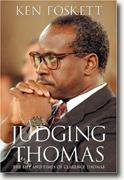Ken Foskett
book reviews:
· general fiction
· chick lit/romance
· sci-fi/fantasy
· graphic novels
· nonfiction
· audio books
· author interviews
· children's books @
curledupkids.com
· DVD reviews @
curledupdvd.com
newsletter
win books
buy online
links
home
for authors
& publishers
for reviewers

 |
Judging Thomas: The Life and Times of Clarence Thomas Ken Foskett William Morrow Hardcover 352 pages August 2004 |
|
"Just remember, that no matter how many degrees you get and how high you go, the lowest white man in the gutter can call you a nigger."
The story of Myers Anderson would, in itself, make a good book. Myers was the offspring of a teenage girl and a married Baptist preacher who arranged a marriage to preempt scandal. He was orphaned before age ten and raised by uncles who worked him hard and showed little affection. These experiences instilled in Myers a desire to be self-sufficient and beholden to no man. He instilled these same values in Clarence. Clarence's mother was the illegitimate offspring of Myers Anderson. She never knew who her father was until she was a teenager. She never lived with Myers, nor did she develop any kind of positive relationship with him. When she became pregnant with Clarence, Myers totally disowned her. She quickly married Clarence's father and had two more children before she was twenty-one. After the marriage dissolved, she asked Myers to take two of her children to raise. He refused. Myers's wife, Tena, threatened to kick Myers out if he didn't take in the boys, her "grandchildren". Myers acquiesced. Myers Anderson enforced strict discipline on Clarence and his brother (also named Myers). Myers had converted to Catholicism as an adult, and he enrolled the boys in Catholic school. Laziness was not an option in the Anderson household. When the brothers were dismissed from school in the afternoons, they worked. When school was out for the summer Myers took them from their home in Savannah to a farm in the country where they worked from sun to sun. Both boys chafed under such discipline, but there was no alternative. Myers instilled in them that they were as good as any white boys, that the only valid assessment of a man was his achievements. The values Clarence learned under Myers were to sustain him through tribulations that lay ahead. The book tells us that Clarence attended seminary, intending to become a priest. Along the way his goal changed and he attended Yale Law School. One also learns of Clarence's radical period while he was in school. Upon graduation he applied to several law firms only to find himself rejected. This experience cemented his views on affirmative action. He had excelled at Yale but couldn't find a job. He believed that most potential employers assumed that he was a token black and that he was unlikely to be able to perform up to requirements. He concluded that affirmative action denied recognition of legitimate achievements. Judging Thomas goes in depth into Clarence's difficulties in the period leading up to the supreme court nomination and eventual confirmation. It goes into great detail of the organized oppositions efforts to "Bork" him by engaging in the politics of personal destruction. It reveals the opposition's strategy of using Anita Hill as their trump card to derail the nomination. One thing that is lacking is that we never learn Anita Hill's motivation for trying to destroy Clarence. The book reveals Clarence's post-confirmation life and how he overcomes the devastation of being reviled by the black community. It also reveals many details of his personal life, especially his work with children. This is a most inspirational and revealing book and everyone could benefit from reading it, no matter what their preconceptions on the subject of Clarence Thomas. © 2004 by Donald Allan Scott for curledup.com. |
|
|
|
 Click here to learn more about this month's sponsor! |
|
| fiction · sf/f · comic books · nonfiction · audio newsletter · free book contest · buy books online review index · links · · authors & publishers reviewers |
|
| site by ELBO Computing Resources, Inc. | |
 At this time, Judge Clarence Thomas is highly regarded by many and held in total contempt by others. This biography attempts to shed light on the matter. It starts with Clarence's ancestors who were slaves. It takes one through the period of events that produced Myers Anderson, the greatest influence on Clarence.
At this time, Judge Clarence Thomas is highly regarded by many and held in total contempt by others. This biography attempts to shed light on the matter. It starts with Clarence's ancestors who were slaves. It takes one through the period of events that produced Myers Anderson, the greatest influence on Clarence.